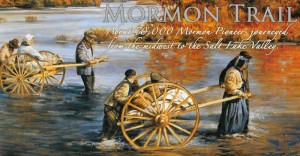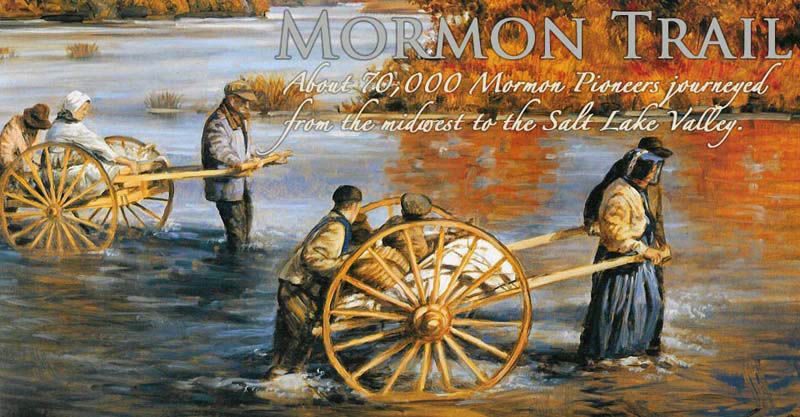Account of Agnes Caldwell Southworth of Crossing the Plains in the Willie Handcart Company
On the twenty-eight day of June, 1856, under the company leader of James G. Willie, we landed in the United States of America. Then began the noted tramp across the desert waste. Mother had one boy fifteen years of age, upon whom she was depending for the greater share of the pulling; when only a day or two out he was attempting to lasso a wild cow to be milked, his foot became tangled in the rope. He was thrown on his shoulder and dragged quite a distance, sustaining a broken shoulder. This of course threw the heavy pulling upon Mother.
 Although only tender years of age, I can yet close my eyes and see everything in panoramic precision before me—the ceaseless walking, walking, ever to remain in my memory. Many times I would become so tired and, childlike, would hang on the cart, only to be gently pushed away. Then I would throw myself by the side of the road and cry. Then realizing they were all passing me by, I would jump to my feet and make an extra run to catch up.
Although only tender years of age, I can yet close my eyes and see everything in panoramic precision before me—the ceaseless walking, walking, ever to remain in my memory. Many times I would become so tired and, childlike, would hang on the cart, only to be gently pushed away. Then I would throw myself by the side of the road and cry. Then realizing they were all passing me by, I would jump to my feet and make an extra run to catch up.
Of the long cold journey, the suffering, and hardships, enough has been told and written, of that terrible night when fifteen were frozen and buried in one grave. My sister Elizabeth Caldwell had her foot frozen. Two of her toes were amputated upon our arrival in the Salt Lake valley.
I have often marveled of the wonderful integrity of character of my mother’s planning and successfully completing such a journey where more able-bodied and stronger—yes, even men—failed miserably.
Winter came in October with eighteen inches of snow, but in spite of this we did not suffer from hunger, due to Mother’s careful and frugal planning. In Iowa City Mother sold a quilt and a beadspread for the sum of twenty-four cents. With this she bought food. She had a way with Indians: she traded trinkets for dried meat, which proved to be of great help to us on the journey. Frequently it would be stormy so that a fire could not be built; then mother would allow each of us to have a piece of dried meat on a piece of bread. As food became more and more scarce and the weather colder, she would stew a little of this meat and make a delicious gravy over it. I guess the reason it tasted so good is that we were allowed only a small portion at each meal.
One very cold night, some young men were on guard. Mother prepared some meat broth, thickened with flour, and a little salt; she gave each one of the young men a half pint. They often declared it saved their lives and never before or since had anything tasted so good.
For baking, Mother dug a hole in the ground. The food was placed in a heavy iron kettle with a tight lid on, then set in the hole and covered over with buffalo chips, which were set afire. This produced a nice, even heat, baking the food evenly.
One day we came to a section inhabited by rattlesnakes. Two of us, my friend Mary Hurren and I, would hold hands and jump. It seemed to me we were jumping for more than a mile. Due to the protecting hand of the Lord, we were not harmed.
The 30th of September we stopped at a station in Laramie, Wyoming. Mother, in company with her fifteen-year-old boy and a young lady, Christena McNeil, who was making the trip under Mother’s care, visited one of the generals in command at the fort to obtain permission to trade some trinkets and silver spoons for flour and meat. The officer said he himself could not use any of the things but to leave the young lady in his office while mother went to another station, where he assured her she would be able to obtain the things she desired. He seemed very kind, and not wishing to arouse any feeling of ill will, she left Christena and Thomas. During her absence the officer used the gold he had, telling her what a fine lady he would make of her. Then he tried discouraging her, pointing out to her how the handcart company would never reach Utah, because of the severe cold, and that they would die of cold and hunger and exposure. Like all noble girls, and true to the cause for which she had left her native Scotland, her family, home, and friends just to be in Utah, she told him in plain language she would take her chances with the others even though it might mean death. She was greatly relieved to have Mother return. The officer, however, seemed to admire her very much for her loyalty to her faith and gave her a large cured ham and wished her well in her chosen adventure.
Just before we crossed the mountains, relief wagons reached us, and it certainly was a relief. The infirm and aged were allowed to ride, all able-bodied continuing to walk. When the wagons started out, a number of us children decided to see how long we could keep up with the wagons, in hopes of being asked to ride. At least that is what my great hope was. One by one they all fell out, until I was the last one remaining, so determined was I that I should get a ride. After what seemed the longest run I ever made before or since, the drive, who was Heber [William Henry] Kimball, called to me, “Say, sissy, would you like a ride?” I answered in my very best manner, “Yes sir.” At this he reached over, taking my hand, clucking to his horses to make me run, with legs that seemed to me could run no farther. On we went, to what to me seemed miles. What went through my head at that time was that he was the meanest man that ever lived or that I had ever heard of, and other things that would not be a credit nor would it look well coming from one so young. Just at what seemed the breaking point, he stopped. Taking a blanket, he wrapped me up and lay me in the bottom of the wagon, warm and comfortable. Here I had time to change my mind, as I surely did, knowing full well by doing this he saved me from freezing when taken into the wagon.
Account quoted from I Walked to Zion by Susan Arrington Madsen. 1994. p56–59.
Twitter •


 Watch a video about the restoration of the gospel on lds.org
Watch a video about the restoration of the gospel on lds.org